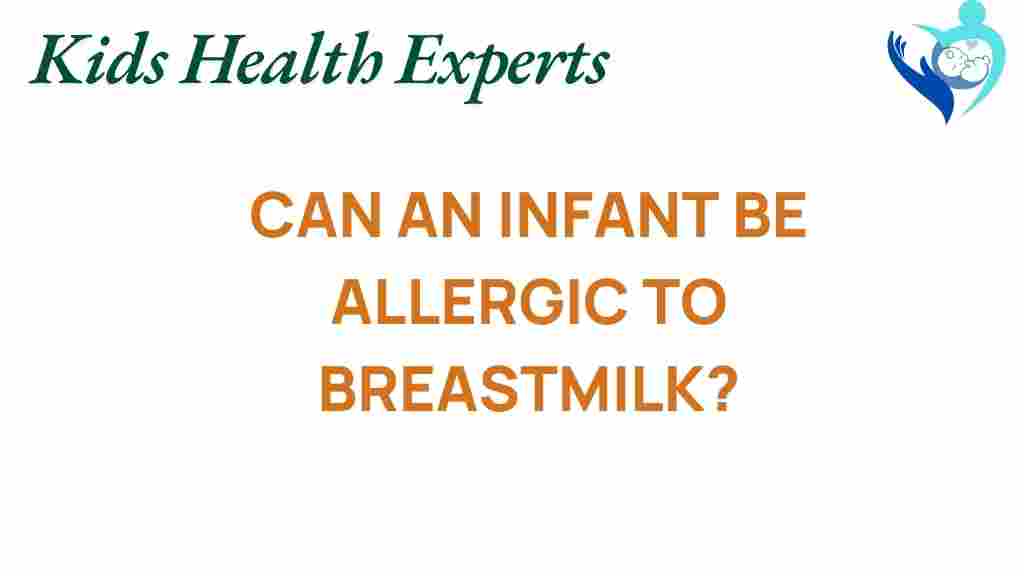Unraveling the Mystery: Can Infants Really Be Allergic to Breastmilk Allergy?
Breastfeeding is widely celebrated for its numerous benefits to infant health, yet many parents face unexpected challenges during this crucial phase. One such challenge is the concern over a possible breastmilk allergy. While allergies are a common topic in pediatric care, the idea that a baby could be allergic to breastmilk itself can be perplexing. In this article, we will explore the nuances of breastmilk allergies, the role of maternal nutrition, and how to navigate breastfeeding challenges.
Understanding Breastmilk Allergy
The term breastmilk allergy can be misleading. In reality, infants are often not allergic to breastmilk itself, but rather to proteins or substances that pass through the mother’s milk from her diet. This can lead to a range of allergic reactions in the infant, which can be concerning for new parents. Understanding this distinction is crucial for proper management and care.
What Causes Breastmilk Allergy?
Breastmilk contains a complex mixture of proteins, fats, carbohydrates, and other nutrients essential for an infant’s growth and development. However, certain proteins—most commonly from dairy, soy, nuts, or wheat—can trigger allergic reactions in sensitive infants. Here are some key points to consider:
- Maternal Diet: What a breastfeeding mother eats can directly influence her milk composition. If the mother consumes allergenic foods, proteins from these foods can enter her breastmilk.
- Infant Health: Some infants have a genetic predisposition to allergies, making them more likely to develop sensitivities to certain proteins found in breastmilk.
- Timing: Allergies can develop at any time, but infants are particularly vulnerable in their first year of life.
Signs of Allergic Reactions in Infants
Recognizing the signs of an allergic reaction is essential for parents to ensure their baby’s well-being. Common symptoms to watch for include:
- Skin reactions: rashes, hives, or eczema
- Gastrointestinal issues: vomiting, diarrhea, or blood in stool
- Respiratory problems: wheezing, coughing, or nasal congestion
- Severe reactions: anaphylaxis, though rare, can occur and requires immediate medical attention
Pediatric Care and Diagnosis
If you suspect that your infant may have a breastmilk allergy, it is vital to consult a healthcare professional. Pediatric care will typically involve a thorough evaluation, including:
Step-by-Step Process for Diagnosis
- Document Symptoms: Keep a detailed record of your infant’s symptoms, including when they occur and their severity.
- Review Maternal Diet: Discuss your diet with your pediatrician to identify potential allergens.
- Allergy Testing: Your doctor may recommend skin prick tests or blood tests to identify specific allergic reactions.
- Elimination Diet: If an allergy is suspected, your pediatrician may suggest an elimination diet for you to identify trigger foods.
- Monitoring: Close monitoring of your infant’s reactions after dietary changes is crucial.
Once a diagnosis is made, a tailored plan can be developed to manage the allergy effectively.
Maternal Nutrition and Its Impact on Infant Health
Maternal nutrition plays a significant role in breastfeeding and can influence the likelihood of allergic reactions in infants. A well-balanced diet for breastfeeding mothers is essential for both their health and the health of their babies. Here are some dietary considerations:
Key Nutritional Guidelines
- Variety: Consuming a wide range of foods can help ensure that breastmilk is nutritionally complete.
- Hydration: Staying well-hydrated is crucial for maintaining breastmilk production.
- Avoidance of Known Allergens: If there is a family history of allergies, it may be wise to limit the intake of common allergens during breastfeeding.
Addressing Breastfeeding Challenges
Breastfeeding challenges can arise for various reasons, and it’s important to address them promptly. Here are some common challenges and troubleshooting tips:
Common Breastfeeding Challenges
- Inadequate Milk Supply: This can lead to stress for both mother and baby. Techniques such as frequent feeding and proper latch can help.
- Painful Nursing: Issues like cracked nipples or engorgement can make breastfeeding painful. Consulting a lactation expert can provide relief.
- Allergic Reactions: If allergies are suspected, managing the maternal diet is key, as previously discussed.
Troubleshooting Tips
- Seek Support: Join a breastfeeding support group or consult a lactation consultant.
- Stay Informed: Educate yourself about infant allergies and signs to watch for.
- Communicate with Healthcare Providers: Regular check-ins with your pediatrician can help navigate any concerns.
Conclusion
In conclusion, while the concept of a breastmilk allergy can be daunting, understanding the underlying factors can empower parents to take action. By recognizing the signs of allergic reactions, seeking appropriate pediatric care, and maintaining a balanced maternal diet, many of the challenges associated with breastfeeding can be effectively managed. Always remember that you are not alone in this journey—support systems are available to help you navigate the complexities of infant allergies and breastfeeding challenges.
If you want to learn more about infant health and nutrition, consider visiting this helpful resource.
For more information on breastfeeding and maternal health, check out this comprehensive guide.
This article is in the category Conditions and created by KidsHealthExperts Team
